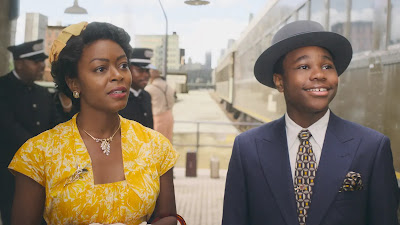Indeed, “Till” is not merely honoring Emmett’s legacy, but bringing him back to life. The first image of the movie is a stunner, Mamie (Danielle Deadwyler) and Emmett (Jalyn Hall) singing together in the car, the camera planted low in the front seat, pointedly in the car with them to highlight the intimacy. And it’s no mere memory. We get to spend time with Emmett, and though his kind of carefree obliviousness to systemic racism given their Chicago residency is underscored in a brief department store scene, and if Chukwu hints at the looming devastation when Mamie hovers her sleeping son like an earthly angel, the inherent joy of Hall’s turn and of the surrounding air makes this more than calculated fatalism. In Emmet’s bedroom wallpaper, dotted with airplanes, you sense both the innocence of youthful enthusiasm and the underlying notion of someone who might have flown so much higher had his life not been maliciously taken.
Though Mamie frequently warns Emmett during this prologue that the deep south is a more hostile experience for African Americans ahead of his trip to Mississippi with cousins, his “I know” rejoinders sound like, well, any teenager’s might in the face of parental haranguing. Once he’s down south, his attitude hardly changes, a cutup even while picking cotton. There is debate, of course, over whether the real Emmett Till really whistled at white store clerk Carolyn Bryant (Haley Bennett in the film), but Chukwu imagines that he does, and scarily imagines the whistle as something akin to the knife cutting through the tension that must have existed for Black Americans every moment of every day in the Jim Crow South. Soon, Emmett is taken forcibly from the home of his great uncle Preacher Wright (John Douglas Thompson). The ensuing violence is kept off screen, and Carolyn Bryant and Emmett’s murderers are hardly, nay, are not treated as people at all. When Mamie first sees Carolyn in the courtroom, the camera keeps a cold and chilly distance marking the latter as barely worth consideration, and when Preacher identifies one of the murderers from the witness stand, he stands up and points down at him, the camera below, turning the world upside down.
Though Mamie frequently warns Emmett during this prologue that the deep south is a more hostile experience for African Americans ahead of his trip to Mississippi with cousins, his “I know” rejoinders sound like, well, any teenager’s might in the face of parental haranguing. Once he’s down south, his attitude hardly changes, a cutup even while picking cotton. There is debate, of course, over whether the real Emmett Till really whistled at white store clerk Carolyn Bryant (Haley Bennett in the film), but Chukwu imagines that he does, and scarily imagines the whistle as something akin to the knife cutting through the tension that must have existed for Black Americans every moment of every day in the Jim Crow South. Soon, Emmett is taken forcibly from the home of his great uncle Preacher Wright (John Douglas Thompson). The ensuing violence is kept off screen, and Carolyn Bryant and Emmett’s murderers are hardly, nay, are not treated as people at all. When Mamie first sees Carolyn in the courtroom, the camera keeps a cold and chilly distance marking the latter as barely worth consideration, and when Preacher identifies one of the murderers from the witness stand, he stands up and points down at him, the camera below, turning the world upside down.
Upon arriving in Mississippi, Mamie is summoned to identify her child’s body, and initially, Chukwu keeps the body hidden from us, a table consciously cutting it off from our view. But after Mamie requests to be alone, the camera moves up and over that table, letting us see the body too, as if letting us into the room with Mamie and epitomizing her historically significant decision to make the image of her son’s disfigured body public. The moment is doubly astonishing for how Deadwyler captures not just heartbreak but the indignation coursing through and then rising from her body, and how it carries Mamie out of the morgue and in front of the media where she tells them what she plans to do. It’s evocative of how the essence of “Till” is Deadwyler’s performance and Chukwu’s presentation of it, breaking the usual confines of biopics to dig deeper. The back half of the movie concerns the trial, and though Mamie knows as well as we do how it will turn out, Chukwu is not content to just dutifully, solemnly follow it to the end. It becomes as much about Preacher’s decision to testify at risk of his own life, announced a scene blocked so that he’s initially sitting until he stands up, side by side with Mamie, and it becomes about Mamie facing the white masses day after day.
In the scene where we see Emmett aboard the train bound for Mississippi, his pleasant spell is broken when he and all the other black passengers are marched to the rear, the camera positioned behind them to essentially render them as faceless. Chukwu, then, responds by putting Mamie’s – Deadwyler’s – face front and center throughout, like Spike Lee in “BlacKkKlansman” quoting the portraits of Charles White, never more than when she testifies in court, filmed in a long take where the camera remains fixed on her, blocking everyone else out of the room yet simultaneously letting the whole world in, Deadwyler’s ferocity blending a mother’s private and public pain until it becomes an unstoppable force.





No comments:
Post a Comment